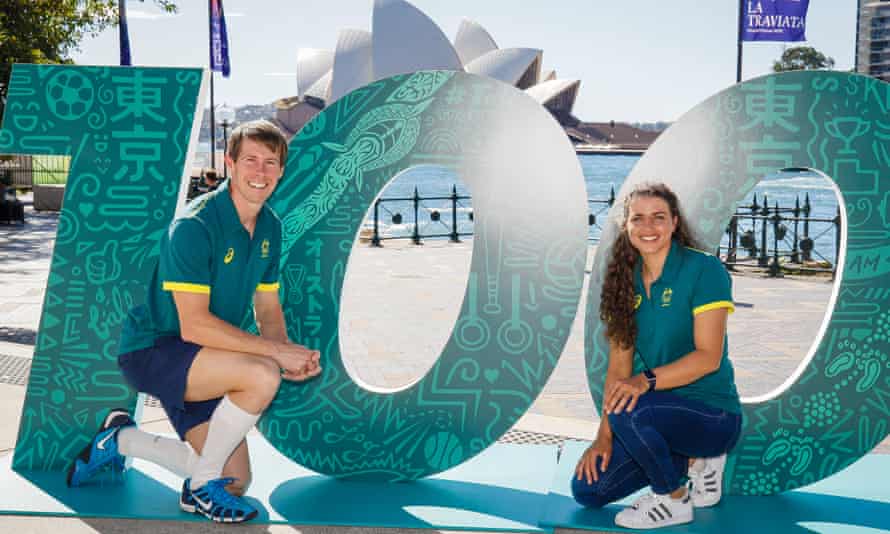Time is ticking as the Australian Olympic Committee waits for guidance on when its 1,400-strong Tokyo Games travelling party will receive the Covid-19 vaccine, with Swimming Australia acknowledging it must “prepare for the worst”.
Australia is set to send approximately 450 to 480 athletes to the 2021 Olympics, with almost 1,000 support staff and officials likely to also make the trip to Japan.
Australia has restricted the rollout of the AstraZeneca vaccine to people under 50 over blood-clotting concerns, slowing the national vaccination program further after the European Union blocked exports to the country.
The sluggish rollout has raised concerns Australia’s athletes could miss out on vaccines, even as rival nations race ahead with inoculations for their Olympians before the rescheduled Tokyo Games start on 23 July.
Some members of the Olympic contingent have already been vaccinated against Covid-19 because of their jobs, but the vast majority are yet to receive it.
Compounding the issue is that numerous athletes are aiming to compete around the world in key warm-up events prior to flying to Japan for the Olympics.
The AOC has repeatedly made it clear it does not wish to jump the queue, but now may be forced to.
“We’re in discussion with minister [Greg] Hunt’s office on a weekly basis,” AOC chief executive Matt Carroll said. “We weren’t expecting athletes or officials to be vaccinated at this time, so we’re not frustrated. Crunch time starts to hit next month, because athletes will start to go overseas. The government is well aware of that.
“I could have clarity [on Thursday]. The governments – federal and state – have a lot on their plate at the moment … we’re working with the government as to how their programs roll out, where they will classify athletes and officials. We’re quite confident.”

Carroll added the Games had been “designed to be held without a vaccination, vaccination is a bonus”.
Speaking at the national swimming championships on the Gold Coast on Thursday, Swimming Australia’s newly appointed chief executive Alex Baumann said
“We have to prepare for the worst. We have to prepare that the athletes won*t be vaccinated,” Swimming Australia’s newly appointed chief executive Alex Baumann said on Thursday.
“But it really is a choice for the athletes. We’re not going to make it compulsory. Obviously it would be preferable to have the athletes vaccinated. We’ll encourage that.”
The United States headlines the list of nations aiming to vaccinate their entire Olympic team before the Games, while Carroll revealed Australia has been working with Pacific Island countries to try to ensure their Olympians are also vaccinated.
Baumann and SA president Kieren Perkins said no swimmers had approached them with concerns about vaccinations or the narrow time frame to have them before Tokyo.
Perkins said he would not want to influence athletes on their decision to have vaccines if they became available but said he would gladly take the AstraZeneca shot.
“As an Australian citizen who is under 50, I’ve seen the stats and I don’t have any problem taking the AstraZeneca vaccine myself,” the 47-year-old Olympic champion said. “From the minute that I’m able to, I’ll be lining up at the door and going in to get it.”
Aside from the obvious upside, vaccines would remove a degree of stress for Olympians attempting to perform at their highest level during a unique Games.
“I definitely would like the vaccine, it’ll make me feel safer and more comfortable,” paddler Jess Fox, one of Australia’s leading medal hopes at the Games, told AAP.
“Especially if I have to go to Europe for competitions in June. Whether or not we have it, we’re still going to be extremely cautious and follow protocols. The important thing is not having Covid, because otherwise you can’t compete.”
Olympians risk being barred from competition if they contract Covid-19, while even being a close contact of a confirmed case could ruin five years of hard work.
“Introverts are going to be the winners here. We’re going to spend a lot of time in our rooms, so being able to distract yourself and switch off in your room will be important,” Fox said.
New Zealand started administering vaccinations to its more than 200 athletes on Wednesday, said New Zealand Olympic Committee chief executive Kereyn Smith.
“We’re really satisfied the government was able to put us in that category of national significance, so that’s now under way and athletes have been worked through according to when they might be departing,” Smith said.
The New Zealand government said last month it would allow athletes to jump the queue in the country’s vaccine rollout to allow them to participate in events of “national significance”.
This content first appear on the guardian

Muchas gracias. ?Como puedo iniciar sesion?